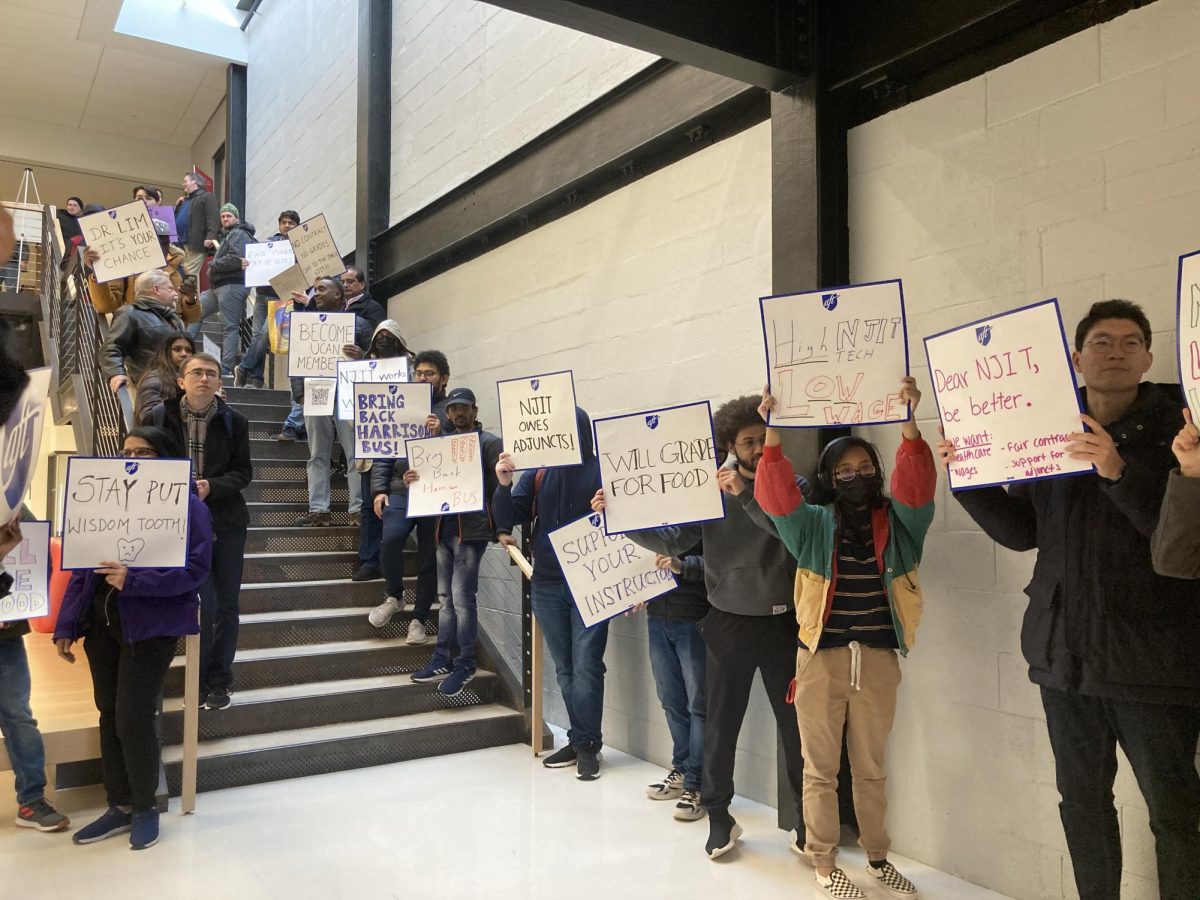July 1, 2023 marked one year since the expiration of the United Council of Academics at NJIT’s (UCAN) old employment contracts. Since then, adjuncts, graduate employees, and postdoctoral researchers have been working at the university without a contract. Our wages remain stagnant through historic levels of inflation; we still lack housing, transportation, sick leave, childcare and healthcare benefits, which are standard at other highly ranked research universities.
While we have been struggling with no raises since 2021, NJIT administrators challenged our elected union leadership and refused to bargain new contracts for months. UCAN still has not received written counterproposals for some critical items since last Spring, such as pay, dental and vision care, and childcare.
Several universities went on strike recently, including the University of California system, Temple University, and Rutgers University, with its Newark campus just across the street. In every case, union members have seen big wins at the bargaining table, which means strikes work. It’s time for UCAN’s membership to pledge their support to strike if necessary.
Many of UCAN’s contract proposals need university funding to be implemented. The most obvious ones are related to compensation. As an example, teaching and research assistants are paid $25,500 for the Fall and Spring semesters at minimum. For many, this is the total amount they receive for those semesters.
Rutgers now pays $35,335 for the same positions – almost $10,000 more for comparable work. In fact, since some departments are federated between Rutgers and NJIT, workers in the same department are paid less for the exact same job just because they are on the ’wrong side of the street.’
Adjuncts and postdocs fare no better. Both are currently paid thousands of dollars less when compared to those across the street at Rutgers. NJIT administration’s latest proposals on all contracts still put our pay well below what equivalent positions at Rutgers make. When pressed, NJIT administrators throw up their hands and cry poverty.
In addition to annual tuition increases, NJIT receives funding from the State of New Jersey in its yearly budget. In the latest budget passed on July 1, NJIT received an additional increase of $4.653 million in outcomes-based allocation. This is up from the originally proposed $5.28 million. Part of this is to offset any anticipated tuition increases due to increased operating costs, like payroll.
The $4.653 million increase is intended to respectfully compensate our members whose working conditions are our students’ learning conditions. NJIT also received $3 million at the last minute for capital improvements. This includes plans like future construction, and any current projects already have funding allocated.
NJIT also received $9.5 million in public polytechnic adjustment aid, which is additional funding for supporting STEM degree instruction. Altogether, NJIT administrators have over $17 million in extra funding to allocate. UCAN’s current proposals would cost the university a fraction of that. In short, NJIT administrators have more than enough to cover UCAN’s proposed pay increases. These extra dollars came to NJIT after the Rutgers strike to acknowledge that our members need to be treated fairly on every campus in the state, including NJIT.
So what else are administrators spending state money on? Instead of investing in student success through teaching, administrators line their own pockets with taxpayer money. University president Dr. Teik Lim is paid over $600,000 a year plus benefits, according to a heavily redacted employment contract obtained by UCAN members.
His inauguration, held in the Spring 2023 semester, cost over $159,000 based on the receipts UCAN members have seen. Dr. Lim’s special day concluded with a black-tie gala where guests were served champagne as they entered. The event was held at the Crystal Plaza in Livingston, just a few minutes away from Lim’s palatial $3.5 million estate.
Former NJIT president Dr. Joel Bloom, who left the presidency in the summer of 2022, will be paid $825,000 by the end of 2024. This figure is in addition to the $5.3 million he received during his time as president. Across the table, NJIT’s bargaining team members are paid six-figure salaries to keep graduate employees, adjuncts, and postdoctoral researchers’ wages low.
Such extravagant spending isn’t just a selfish usage of public money by greedy administrators — it’s undemocratic. These administrators are largely unelected and not held accountable to New Jersey taxpayers. So far, they’ve forced low wages on NJIT’s academic workers while keeping their own salaries high without having to respond about it.
Enough is enough. It’s because of our dedicated work that NJIT has reached its renowned status. We are doing world-class, state-of-the-art research, and we are teaching the next generation to do the same. Our working conditions are students’ learning conditions, and now is the time to improve both. If we want management to listen, then it’s time for the academic workers of NJIT to unite in support of a strike.





























Paul Schorr • Oct 16, 2023 at 5:58 pm
How did he get a “palatial estate of $3.5 million?
What was his pay in Texas?
When is his contract up for renewal?
Your report seems to indicate that Dr. Joel Bloom in retirement will receive more than Dr. Kim .
What are the salaries and benefits of other college presidents – Stevens, for example?